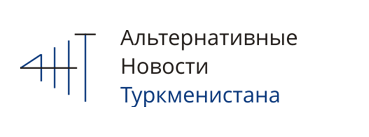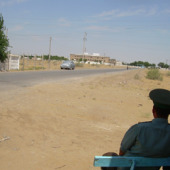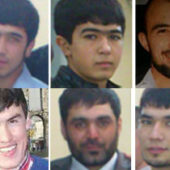By Felix Corley, Forum 18 News Service
On 22 October eight of Turkmenistan’s nine known imprisoned prisoners of conscience jailed for exercising freedom of religion or belief were released under presidential amnesty, Forum 18 News Service has learnt. All were being held in a harsh labour camp in eastern Turkmenistan. Six were conscientious objectors to military service and two had been imprisoned on fabricated charges to punish them for exercising their freedom of religion or belief. One newly-sentenced conscientious objector, Ruslan Narkuliyev, was not released (possibly as his name was left off a list), and nor was a Protestant, Umid Gojayev, imprisoned on what his friends say were disproportionate charges brought because of his beliefs. Two Jehovah’s Witnesses serving suspended sentences also appear not to have been amnestied. There are also an unknown number of Muslim prisoners of conscience jailed for exercising their freedom of religion or belief, as well as prisoners of conscience jailed for other reasons. Jehovah’s Witnesses hope the prisoner releases may lead to recognition of the right to conscientious objection to military service.
Late in the day on 22 October, eight of Turkmenistan’s nine known imprisoned prisoners of conscience jailed for exercising freedom of religion or belief were released under presidential amnesty, Forum 18 News Service has learnt. All were being held in a labour camp in eastern Turkmenistan. Six were conscientious objectors to military service and two had been imprisoned on charges that their fellow Jehovah’s Witnesses insist were fabricated to punish them for exercising their freedom of religion or belief.
One newly-sentenced conscientious objector was not released, and nor was a Protestant imprisoned on what his friends say were disproportionate charges brought because of his beliefs. Two Jehovah’s Witnesses serving suspended sentences appear also to have not been amnestied (see below). There are also other prisoners of conscience who are not known to have been jailed for exercising freedom of religion or belief.
Jehovah’s Witnesses told Forum 18 that they are «relieved» that most of their imprisoned fellow believers have been released. They noted on 28 October that the amnesty is an «encouraging» development and are hopeful that it will now result in recognition of the right to conscientious objection to military service. This would be in line with recommendations in the 19 April 2012 Concluding Observations of the Human Rights Committee on Turkmenistan and the 5 July 2013 report by the Human Rights Council’s Working Group on Turkmenistan’s Universal Periodic Review.
Prisoner amnesty
The Jehovah’s Witness prisoners of conscience were freed as part of the prisoner amnesty to mark the 23rd anniversary of Turkmenistan’s independence from the Soviet Union on 26 and 27 October. President Gurbanguly Berdymukhamedov signed a decree on 21 October, the government website noted the same day. The decree notes that amnestied prisoners are to be released from prison and freed from further punishment.
Unlike in some earlier years, no lists of freed prisoners were published in the state media, nor the number of prisoners being freed, sources told Forum 18 from the capital Ashgabad [Ashgabat]. None of the known prisoners of conscience was freed in the last prisoner amnesty in July, when the government claimed that more than a thousand prisoners were freed.
Latest prisoner of conscience
However, the most recent imprisoned conscientious objector, Jehovah’s Witness Ruslan Narkuliyev, sentenced to two years’ imprisonment on 30 September, was not freed under amnesty. «We are hopeful that he will also be released in the coming days,» Jehovah’s Witnesses told Forum 18. «It seems that his name might have been missed on the list of prisoners that should be released based on the amnesty, since he had only been imprisoned a few weeks before the amnesty was proclaimed.»
On 30 September, less than three weeks after his 21st birthday, Narkuliyev was imprisoned by a court in Turkmenabad [Turkmenabat] (formerly Charjew) in eastern Turkmenistan for refusing the call-up to compulsory military service, Jehovah’s Witnesses told Forum 18.
Like all the other sentenced conscientious objectors, he was punished under Criminal Code Article 219, Part 1. This punishes refusal to serve in the armed forces in peacetime with a maximum penalty of two years’ imprisonment.
Turkmenistan offers no alternative to its compulsory military service. Article 41 of the Constitution describes defence as a «sacred duty» of everyone and states that military service is compulsory for men. Military service for men between the ages of 18 and 27 is generally two years. A proposed Alternative Service Law was reportedly drafted in 2013, but officials have been unable to tell Forum 18 if and when it might be adopted.
Soon after his sentencing, Narkuliyev was transferred to the general regime section of the Seydi Labour Camp, in the desert in the eastern Lebap Region. This is where most religious prisoners of conscience – including conscientious objectors serving their first jail sentences – have been held. Prisoners of conscience who have experienced Seydi Labour Camp have documented harsh conditions, including the torture of prisoners by the authorities.
Eight amnestied prisoners
Of the eight amnestied Jehovah’s Witness prisoners of conscience, six are conscientious objectors:
1. Dovran Matyakubov, aged 22, 2 years, Dashoguz Court, December 2012;
2. Matkarim Aminov, aged 23, 2 years, Dashoguz Court, January 2013;
3. Amirlan Tolkachev, aged 21, 18 months, Turkmenabad Court, July 2013;
4. Suhrab Rahmanberdiyyev, aged 19, 18 months, November 2013;
5. Pavel Paymov, aged 24, 1 year, Ashgabad Court, February 2014;
6. Merdan Amanov, aged 19, 1 year, Ashgabad Court, July 2014.
The two other amnestied Jehovah’s Witness prisoners of conscience were imprisoned on charges of possessing pornography, which fellow Jehovah’s Witnesses insist were fabricated:
7. Aibek Salayev, aged 35, 4 years, Dashoguz Court, April 2012;
8. Bahram Shamuradov, aged 42, 4 years, Dashoguz Court, July 2014.
All eight of these prisoners had been held in the general regime section of Seydi Labour Camp, except for Matyakubov and Aminov. The two men (who were both serving second sentences on the same charges) were in the strict regime section of the same camp.
Those amnestied have to report regularly to police, apparently on a weekly basis, Jehovah’s Witnesses told Forum 18.
Protestant thought not to have been freed
A 32-year-old Protestant imprisoned on charges of hooliganism, Umid Gojayev, appears not to have been freed, Protestants in Turkmenistan told Forum 18 on 28 October. He is serving a four year prison term imposed by a Dashoguz court in May 2012. Local Protestants insist the criminal charges were brought disproportionately because of his religious beliefs.
Like almost all the Jehovah’s Witness prisoners, Gojayev has been held in the general regime section of Seydi Labour Camp.
Others jailed for exercising freedom of religion or belief
There are also an unknown number of Muslim prisoners of conscience also jailed for exercising their freedom of religion or belief. Musa (last name unknown), a Muslim from Ashgabat who seems to have been imprisoned for teaching the Koran to children, was being held in Seydi Labour Camp at the beginning of 2012.
Those on suspended sentences not amnestied
Ashgabad-based Jehovah’s Witness conscientious objector Murat Sapargeldyyev was also not amnestied. He was given a two-year suspended sentence, where one fifth of his income is to be handed to the state, by an Ashgabad court in January 2014 under Criminal Code Article 219, Part 1.
Nor was fellow Jehovah’s Witness Bibi Rahmanova amnestied. Sentenced to four years’ imprisonment on 18 August, after the Ministry of State Security (MSS) secret police found her collecting religious literature. Officials also assaulted her and her husband and detained her four-year old child.
Rahmanova had her sentence suspended on appeal on 2 September. She was freed from prison in Dashoguz that evening after nearly four weeks’ detention, and is serving her four-year conditional sentence at home, living on probation for three years. During that time she must maintain «good behaviour» and needs permission from the authorities to leave her home city of Dashoguz or move to another location. No action has been taken against officials who assaulted her and her husband and detained her four-year old child.
Those serving suspended sentences are under tight restrictions. They must be home each night, cannot travel outside their home city without special permission, and one fifth of their income is handed to the state.





